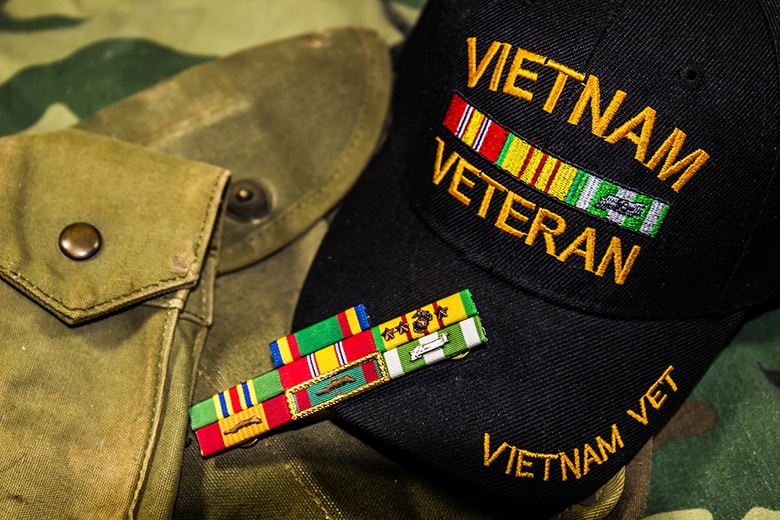As of writing this article, blue water Vietnam Veterans are entitled to the same presumptive service connection as if they had boots on the ground in the Republic of Vietnam. The United States Court of Appeals for the Federal Circuit has ruled that blue water Vietnam Veterans are entitled to receive benefits for illness because of exposure to Agent Orange.
stockfresh_6621310_military-ship_sizeM-300x201Vietnam Veterans know that for many years the VA has distinguished between what is known as “blue water Veterans” and “boots on the ground” Veterans. Blue water Veterans are Veterans who served aboard ships off the coast of the Republic of Vietnam, or in Vietnam’s deepwater ports, between January 9, 1962, and May 7, 1975. Boots on the ground Veterans are Veterans whose feet physically touched the ground in the Republic of Vietnam, even if just for one second, during that same period.[1] For the sake of brevity, “brown water” Veterans (those who served in Vietnam’s navigable rivers and in-country waterways), Veterans who served on airbases in Thailand, and other Veterans who have been added to the presumptive service-connection list will simply be included under the category of “boots on the ground” Veterans.
In Procopio v. Wilkie, 2017-1821 (January 29, 2019)[2] (click here for the decision), the United States Court of Appeals for the Federal Circuit held that Congress had always intended all members of the uniformed services who served within the twelve nautical miles territorial sea of the Republic of Vietnam to be entitled to the presumptions detailed in 38 U.S.C. §1116. Congress, the Court states, never had any intention of differentiating between blue water Veterans and boots on the ground Veterans. The Court goes further to state that the VA never had the authority to add the boots on the ground requirement at a later date. In adding this later requirement and subsequently denying Veterans who had served in the territorial waters off the coast of the Republic of Vietnam for Agent Orange related presumptive service-connected conditions, the VA ceased applying the applicable law accurately. As of the day this article was written, February 1, 2019, the decision in Procopio had not been appealed.
There is an argument that when the VA ceased applying the applicable law accurately, the VA committed what is known as Clear and Unmistakable Error (“CUE”). When the VA engages in CUE, it must revise prior erroneous rulings to conform to the true state of law that existed at the time of the original adjudication.[3] In order to establish CUE, the Veteran must show that:
Either the facts known at the time of the decision being attacked on the basis for CUE were not before the adjudicator or the law then in effect was incorrectly applied;
An error occurred based on the record and the law that existed at the time; and
Had the error not been made, the outcome would have been manifestly different.[4]
The Board of Veterans’ Appeals’ CUE regulations detail CUE as:
Clear and unmistakable error is a very specific and rare kind of error. It is the kind of error, of fact or of law, that when called to the attention of later reviewers compels the conclusion, to which reasonable minds could not differ, that the result would have been manifestly different but for the error. Generally, either the correct facts, as they were known at the time, were not before the Board, or the statutory and regulatory provisions extant at the time were incorrectly applied.[5]
It is very important to note that the Supreme Court of the United States holds that a “judicial construction of a statute is an authoritative statement of what the statute meant before as well as after the decision of the case giving rise to that construction.”[6] This is important because the Court in Procopio did not change the law, it only provided a controlling judicial construction of that law. If you or someone you know is a Veteran of the Vietnam War who has wrongly been denied service-connection for agent orange related conditions, please contact a Veterans representative to look into whether a CUE claim may apply. CUE claims have a heavier pleading requirement than other appeals. Although Procopio could be reversed by the Supreme Court of the United States, I still urge action by all affected Veterans.
[1] There are many exceptions to this, including but not limited to service on an inland river or other “brown water,” or service on airbases in Thailand.
[2] En banc
[3] Russel v. Principi, 3 Vet. App. 310, 313 (1992)(en banc).
[4] Bouton v. Peake, 23 Vet. App. 70,71 (2008). See also Prinkey v. Shinseki, 735 F.3d 1375, 1377 (Fed. Cir. 2013) (quoting Cook v. Principi, 318 F.3d 1334, 1344 (Fed. Cir. 2002)(en banc)).
[5] 38 C.F.R. § 20.1403(a) (2018); see Stallworth v. Nicholson, 20 Vet. App. 482, 490 (2006).
[6] Rivers v. Roadway Express, 511 U.S. 298, 312-313, 114 S. Ct. 1510, 128 L. Ed. 2d 274 (1994)
